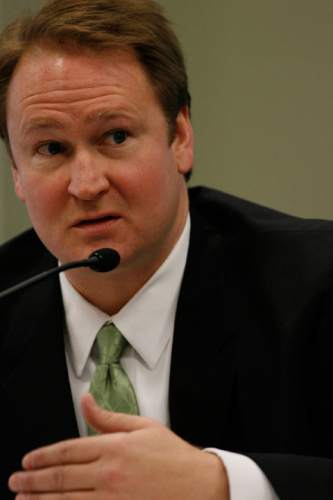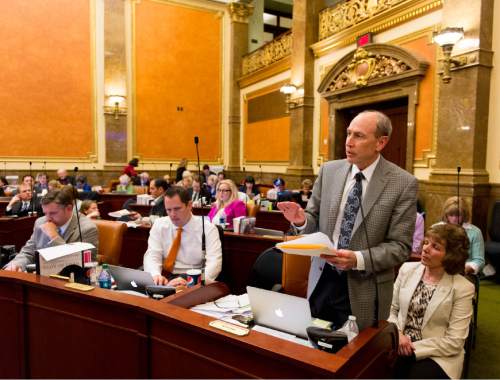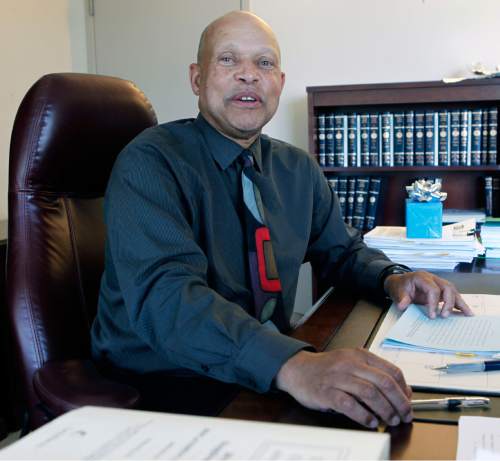This is an archived article that was published on sltrib.com in 2016, and information in the article may be outdated. It is provided only for personal research purposes and may not be reprinted.
Under pressure from state lawmakers, the committee that vets judicial hopefuls will strike language from the application dealing with diversity, at least for now.
Rep. Merrill Nelson, R-Grantsville, had sought to have the diversity language stricken from the judicial application, arguing that the Utah Constitution and state law do not allow the Judicial Nominating Commissions to consider factors outside of an applicant's fitness for office.
For years, the application has included "diversity on the bench," and says that, if candidates' qualifications are equal, "it is relevant to consider the background and experience of the applicants in relation to the current composition of the bench."
Ron Gordon, executive director of the Commission on Criminal and Juvenile Justice (CCJJ) who coordinates the nominating commissions that vet judges, told lawmakers Thursday that diversity is not considered often, but is a worthwhile secondary consideration when screening candidates.
"I don't think we're saying genetics necessarily, but I think we're saying the experience of life does have something to do with one's ability to judge," Gordon said. Those experiences form the way everyone thinks, and critical thinking."
But Republicans on the Legislature's Administrative Rules Committee argued that CCJJ had not gone through a rule-making process to include diversity in the selection criteria, but had put it on the application anyway.
Sen. Mark Madsen, R-Saratoga Springs, questioned how far the nominating commissions could stray when it comes to creating criteria — could they pick only judges who "look good in the robes?" he asked — and said it should be up to the Legislature to decide what factors should be weighed when vetting candidates.
Madsen said he'd hoped that we had moved beyond a "tribal society," and said that, "Diversity, especially when it's forced diversity, creates more prejudices than it solves."
Nelson said that diversity will happen gradually over time as more women and minorities graduate from law school and work their way up in the legal field.
Rep. Carol Spackman Moss, D-Holladay, the only woman on the legislative committee, disagreed with Nelson that diversity will just "happen over time" and said the language on the application provides an opportunity to shape the judiciary to reflect the population it serves.
"[Removing the language] looks like an attempt to deliberately discriminate and follow the same old same old and get the typical male judge — a middle-aged, white, male judge," she said.
Nelson applied for a vacancy on the state court in the 1990s and was a finalist for the position, but did not receive the nomination. He said the discussions are private, so he has no way of knowing why he wasn't chosen.
"But that's immaterial," he said. "I have no interest in a judgeship at this point. I just want to make the process fair. For me, it's unfair to discriminate against anyone on the basis of race or gender."
At the end of a two-hour hearing Thursday, Gordon backed down, saying diversity language would be removed from the application. But because he said the commission feels strongly enough about diversity being part of the equation, he would begin a rule-making process to satisfy the legislators and bring the new rule back to the committee for review.
It may not be enough for Nelson and other committee lawmakers, who argued that, even if the commission jumps through the required hoops, they should not — and are not permitted by law — to include racial and gender diversity when considering judges.
"The notion that women and minorities need a special preference is offensive," Nelson said. Experience is never entirely equal, he argued, and the idea that diversity is essentially a tie-breaker is nonsense. "To me, that is a fiction to justify racial and gender considerations, which is totally inappropriate. … To defend this is to say it's appropriate to select judges based on race and gender. To me, that is intolerable."
But Sen. Jim Dabakis, D-Salt Lake City, questioned why, in a state where only 26 percent of judges are female, 3 percent are Latino and Asian, and there are no black judges, Nelson was trying to strike language that would promote diversity. "Is it that we're not getting enough 50-year-old downtown big corporate lawyers and all these minorities are edging out the overwhelming [majority]?" Dabakis asked.
"We have a terrible, horrendous record of minority judges … because most of the people picking judges are from the same tribe," Dabakis said. It undermines confidence in the justice system, he said, and if it doesn't change, "we're setting ourselves up for a Ferguson situation," where mostly black protesters in Ferguson, Mo., rioted after police killed an unarmed black man and the officers were not prosecuted.
In an interview Wednesday, retired 3rd District Judge Tyrone Medley, the only African-American appointed to the Utah bench, argued for the importance of diversity in the courtroom.
Diversity, he said, "enhances the legitimacy of the court system and is consistent with our population following the rule of law. … Without it, you have a scenario where, at a minimum, you have a perceived bias in the decision-making process."
Nelson contends that the criteria for choosing judges under the law all tie to qualifications "and race and gender are not qualifications. They are unrelated."
"The reason race and gender are distinct from these other considerations of impartiality and integrity and hard work, those are character traits, whereas race and gender are immutable characteristics over which none of us have any control," he said. Even if it's used as a tie-breaker, "the minute you do that, you are nominating a judge based on race or gender and you're choosing a judge based on race or gender. That is what is most odious in our society."
Gordon said the commission's rule would likely be based largely on the language already on the judicial application.
Once the rule is submitted and published, there is a 30-day public comment period and can take effect at least seven days after the public comment period closes.
Twitter: @RobertGehrke







